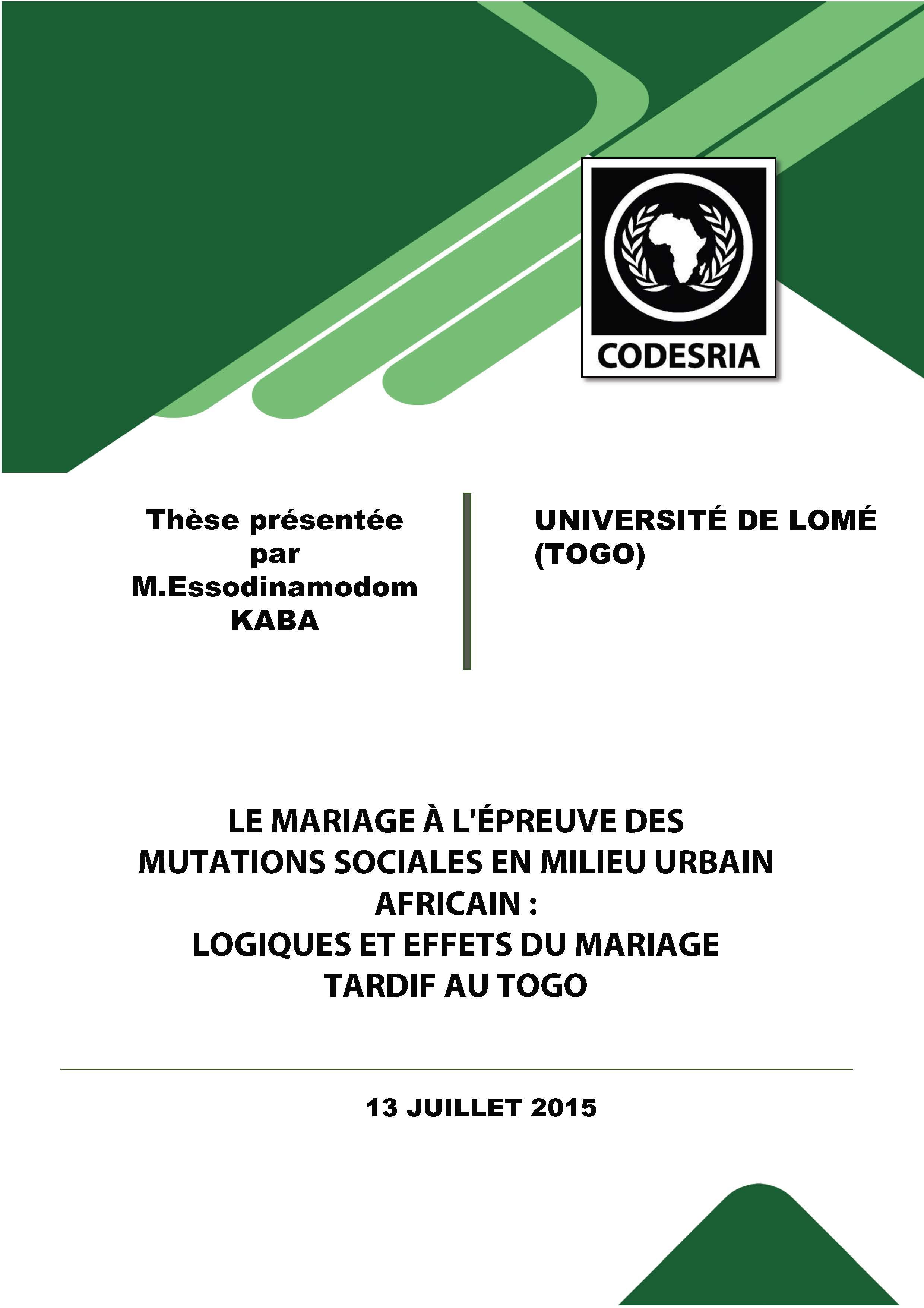LE MARIAGE À L'ÉPREUVE DES MUTATIONS SOCIALES EN MILIEU URBAIN AFRICAIN : LOGIQUES ET EFFETS DU MARIAGE TARDIF AU TOGO
Keywords:
Celibacy, Conjoined, Young, belated Marriage, City, SexualitySynopsis
The present Doctoral Dissertation is located in the extension of the analysis of the social mutations of the African nuptiality. Marriage is of vital importance in Africa for the individual as well as for his or her community. It has even appeared a long time like a social prescription insofar as all individual as growing was already registered in a programmatic design that drove him or her ineluctably to his or her marriage. In other words, the strong valorization of marriage in these African societies led to a systematization of the entry in marriage and odium of the prolonged celibacy dragging the reduction of the belated marriage to its adequate portion.
However, since the end of the years 1960, one witnesses an important change in the marriage rates of many countries in the Sub-Saharan Africa. The Togolese country does not make an exception to this phenomenon. Age to the first marriage of the young pass of 22,9ans in 1961 to 28 years in 1998. The size of this phenomenon essentially urban, contrasts with a certain number of realities that make it incongruous. Teenage marriage persists in spite of the efforts of modernization of the legal norms. While polygamy is developed under different shapes, the cohabitation, less coercive, remain accessible and practiced extensively. Besides, the youth enjoy a growing autonomy concerning customs in the setting of the democratization of the relationships between parents and children.
However, men and women seem to opt nowadays for a belated entry in marriage in spite of the pressures from all sides.
Considering the main cities of Togo as some concrete examples, this work intends to show the logics that contributed to the establishment of the belated marriage as a social phenomenon. One proceeds by a global exam of the African nuptiality which will then lead to an approach to the analysis of the motivations behind the belated marriage in vogue in the contemporary society. Inspired by different approaches, this thesis proposes a multivaried analysis of the phenomenon while laying emphasis on the role of the cultural, economic and social factors in the anchorage of this new social order. The setting in work of a mixed methodological approach (quantitative and qualitative) by 472 individuals permitted to store edifying results. The survey lets appear that the phenomenon founds on the one hand on the weakening of the family's roles dragging the decline of the marriage programmatic systems and on the other hand on a set of major changes intervened during the process of development of the country. The study also highlights the socio-cultural evolution having marked the mind of the young generations with the development of a new perception of the marriage as a result. The economic crisis of these last decades, the influence of the school system, the individuation and the democratization of social relationships, the research of autonomy and the taste of individual liberty of the young generations are as many factors examined in relation with the phenomenon of age receding to the first marriage.
Downloads
References
AbdouMaliq S., 1998, Mutations urbaines en Afrique, Dakar : CODESRIA.
Abelès M. & Collard C., 1985, Age, pouvoir et société en Afrique noire, Paris : Karthala.
Adepoju A., 1999, La famille africaine : politiques démographiques et développement, Paris : Karthala.
Adjamagbo A., Antoine P., Beguy D. et Dial F. B. (2006), «Comment les femmes concilient-elles mariage et travail à Dakar et à Lomé?, IRD, Communication aux 6è journées scientifiques du Réseau « Démographie » de l’AUF», Cotonou (Bénin, 22-25 novembre 2005).
Affilé B. et al. 2001, Les grandes questions sociales contemporaines, Paris : L’Etudiant.
African Union, 2006, Youth charter, Addis-Ababa: African Union.
Agounke A. et al., 1989, « Enquête démographique et de santé au Togo », URD, Direction Générale de la Statistique, Division de la démographie.
Agounké A., 1991, Les formes nouvelles d'union dans les villes de l'Afrique de l'Ouest: aspirations et ruptures, in Actes de la Conférence «Femme, Famille et Population», Ouagadougou, 24-29 avril 1991, vol.1.
Amato P.R. & Previti D., 2003, « People’s reasons for Divorcing: Gender, Social Class, the Life Course, and Adjustment » in Journal of Family Issues, n°5.
Amouzou E. A., 2008, Étude sur la situation de l'emploi de jeunes au Togo, Rapport d'étude du Ministère de travail et de la sécurité sociale, Lomé, Direction de la politique nationale de l'emploi.
Anani A. I., 2008, « La dot dans le code des personnes et de la famille des pays d’Afrique occidentale francophone : cas du Bénin, du Burkina-Faso, de la Côte d’Ivoire et du Togo », in The Danish Institute for Human Rights.
Antoine P. & Djire M., 1998, « Crise et évolution des comportements matrimoniaux à Daka » in : Francis Gendreau, éd., Crises, pauvreté et changements, Paris, AUPELFUREF et Éditions ESTEM.
Antoine P. & Nanitelamio J., 1989, « Nouveaux statuts féminins et urbanisation en Afrique », in Politique africaine, Paris, N°36.
Antoine P. & Pilon M., 1998, « La polygamie en Afrique : quoi de neuf ?», in Chronique de la CEPED, No 28.






